Physical Address
304 North Cardinal St.
Dorchester Center, MA 02124
We independently evaluate and recommend products we believe will benefit our readers. If you purchase through links on this page, we may earn a commission.
Written By:

Published On: July 6, 2025
Last Updated On: September 6, 2025
Reviewed By:

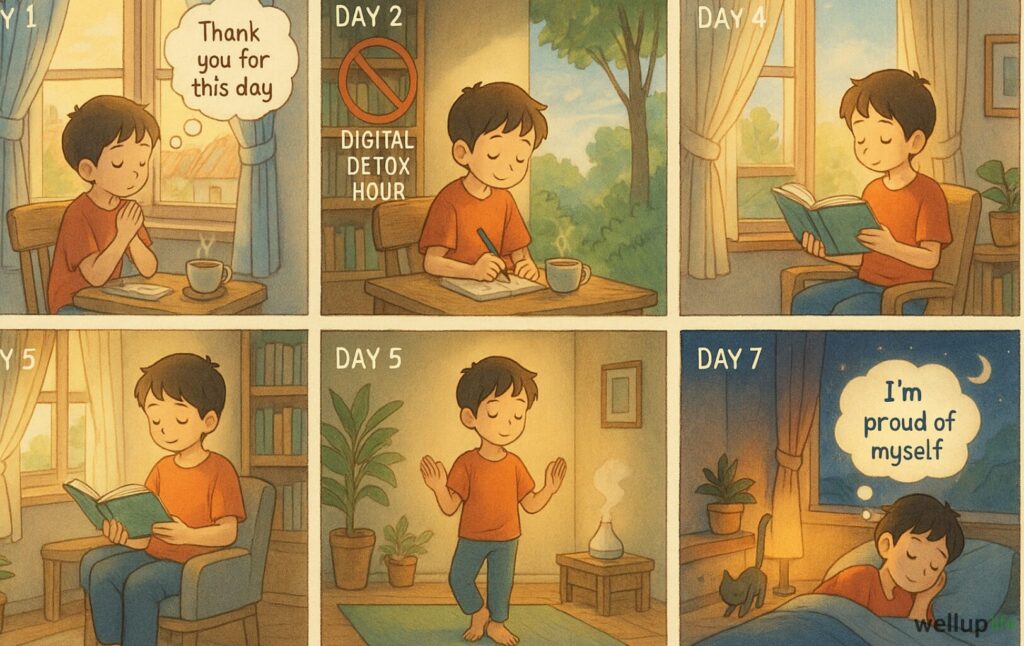
What if I say you need only 7 days to change your mindset and routine?
Yes, you read it right. You need only 7 days to change your mindset and routine. How is this possible? It can be very possible if you have the right focus and consistency; a single week is sufficient, you don’t need a month or year to kickstart real, lasting change. You just need a week.
Once you start working on yourself, you start noticing changes in yourself in just a week. That’s the power of self-improvement. So here I have a self-improvement challenge for you. You have to follow this for a week consistently without missing it for a single day. Let’s see how disciplined you are. This self-improvement challenge is built around micro-habits, small, intentional actions that create momentum without overwhelming you.
This 7-days self-improvement challenge is designed to help you reconnect with yourself, build clarity, and spark motivation through simple daily practices. Each day introduces a new micro-habit that takes just a few minutes but has a powerful impact on your mood, energy, and focus.
Short-term challenges like this are perfect for overcoming procrastination, testing new routines, and creating a sense of accomplishment fast. And to make it easy, I’ve included a free printable PDF with a daily checklist, habit tracker, and reflection prompts to guide you every step of the way. So, are you ready for this challenge? If yes, then let’s get started.
This 7-day self-improvement challenge is built around a simple idea: one small habit a day, for just 5 to 10 minutes. Each day introduces a new micro-habit that’s easy to follow, but powerful enough to spark meaningful change in your mindset and lifestyle.
Whether you’re just beginning your personal growth journey, feeling stuck in a rut, or overwhelmed by self-help advice, this challenge is designed to be doable, flexible, and effective—no complex routines or long checklists.
Each habit focuses on improving your mental clarity, emotional balance, and daily momentum, without requiring a complete lifestyle overhaul. It’s about taking one small step at a time and building confidence through consistent action.
If you’re ready to start with simple habits that actually make a difference, this challenge is a perfect entry point for you. You can also explore more in-depth ideas in our related guide: 10 Daily Habits That Can Change Your Life
Now it’s time to begin your daily challenge. When you first look at the tasks, you might think, “This looks way too easy.” And honestly, that’s the beauty of it—each habit is simple and takes only a few minutes. But here’s something important to understand: just because it’s simple doesn’t mean it’s easy to follow through.
This challenge isn’t about pushing yourself to the limit. It’s about testing your ability to stay consistent, even with the small things. Anyone can do something once, but doing it every day, without skipping, is what builds real strength and self-discipline.
So don’t focus on how easy each habit looks. Focus on showing up for yourself every single day. That’s the real challenge—and that’s how you’ll grow.
If you stay committed for all 7 days, you’ll not only complete this challenge, but you’ll also prove to yourself that you can create positive change, and you’ll feel proud.
Your first challenge is Morning Gratitude: Write down 3 things you’re grateful for today, right after you wake up.
Why Gratitude Matters:
Gratitude is one of the most powerful habits for shifting your mindset. Starting your day with a few moments of appreciation helps you focus on the good instead of the stress. It sets a positive tone for the rest of the day and trains your brain to notice blessings, no matter how small.
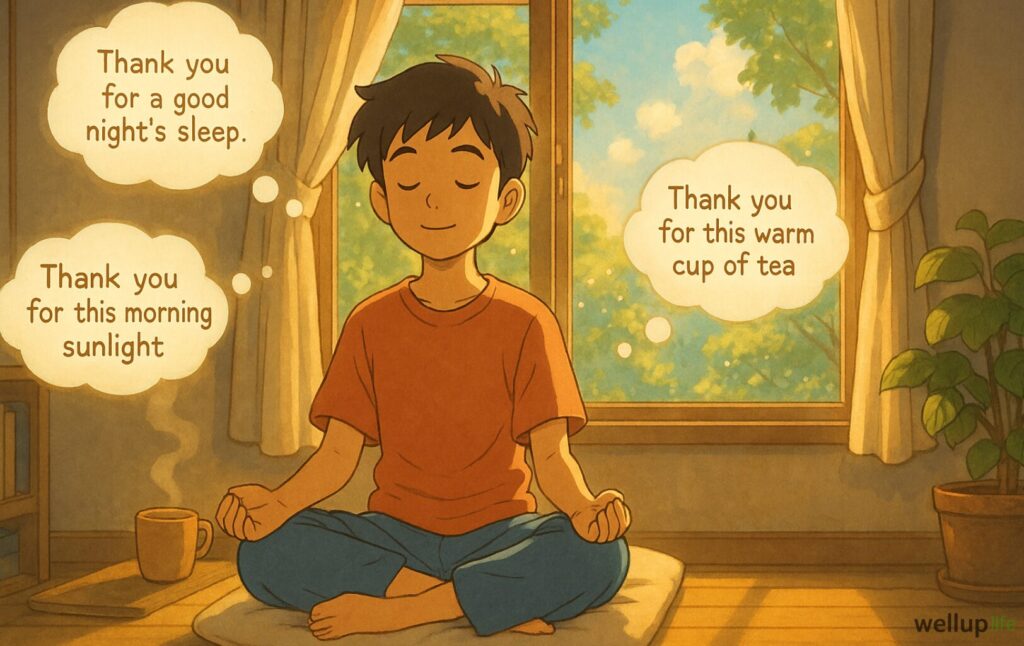
You don’t need anything fancy—a notebook, a scrap of paper, or even your phone’s notes app will do. Just take 2 minutes and write down three things you’re thankful for. It could be as simple as “a good night’s sleep,” “morning sunlight,” or “a warm cup of tea.”
💡 Tip:
Try doing this every morning, even after the challenge. Over time, gratitude can boost your mood, reduce stress, and improve your overall outlook on life [1]Emmons, R. A., & McCullough, M. E. (2003). Counting blessings versus burdens: An experimental investigation of gratitude and subjective well-being in daily life. Journal of Personality and Social Psychology, 84(2), 377–389..
“Gratitude turns what we have into enough.”
 — Aesop
— AesopYour second challenge is: Take a 1-hour break from all screens—no phone, no laptop, no TV.
Why Digital Detox Matters:
Our minds are constantly bombarded with notifications, messages, and endless scrolling. This digital noise can leave us feeling drained, distracted, and even anxious. Taking just one hour away from screens gives your brain a chance to breathe, reset, and refocus. Try to keep yourself away from the screen for an hour daily. Gradually, you will experience more mental clarity, reduced stress, and boosted focus [2]Rosen, L. D., et al. (2014). Media and Technology Use Predicts Ill-Being Among Children, Preteens and Teenagers Independent of the Negative Health Impacts of Exercise and Eating Habits. Computers in Human Behavior, 35, 364–375..

Use this time to do something offline—go for a walk, journal, draw, read a physical book, talk to a loved one, or just sit in silence and reflect. You’ll be surprised how refreshing it feels to disconnect from the digital world, even for a short while.
💡 Tip:
Try doing your digital detox in your evening routine, an hour before bed. It can help you sleep better and wind down naturally.
“Almost everything will work again if you unplug it for a few minutes… including you.”
 — Anne Lamott
— Anne LamottYour third challenge is: Take a 10-minute walk or do a light stretching session today.
Why this matters:
Movement is medicine for both the body and mind. Just 10 minutes of gentle activity can boost your mood, reduce stress, increase dopamine, and improve blood flow [3]Sharma, A., Madaan, V., & Petty, F. D. (2006). Exercise for Mental Health. Primary Care Companion to The Journal of Clinical Psychiatry, 8(2), 106.. It doesn’t have to be intense or complicated. The goal is simply to move your body and release tension.

Go for a walk around your home, outside in fresh air, or even pace around your room. If walking isn’t an option, try stretching your neck, shoulders, back, and legs. It helps ease stiffness, especially if you’ve been sitting a lot.
💡 Tip:
Pair this habit with your favorite music or podcast to make it enjoyable. And remember, it’s not about burning calories, it’s about building energy and clearing your mind.
Your 4th day challenge is: At the end of your day, write down one win (something you did well) or one lesson (something you learned).
Why Journaling Matters:
Life moves fast, and it’s easy to forget the small victories—or miss the valuable lessons hidden in everyday moments. Taking a few minutes to reflect helps you slow down, process your day, and build self-awareness [4]Pennebaker, J. W. (1997). Writing about emotional experiences as a therapeutic process. Psychological Science, 8(3), 162–166..
A “win” could be as simple as waking up on time, staying calm in a tough situation, or completing a task you were avoiding. A “lesson” might be something you realized about yourself, your habits, or how you handled a challenge.
Over time, this practice trains your brain to look for growth instead of dwelling on mistakes. It also builds confidence and emotional intelligence, both are key to long-term self-improvement.
💡 Tip:
Keep it short and honest. You’re not writing a novel—just a few lines that help you check in with yourself.
“We do not learn from experience… we learn from reflecting on experience.”
 — John Dewey
— John DeweyYour 5th challenge is: Read 5 pages of a book today — ideally book should be nonfiction or something that inspires personal growth.
Why Reading Matters:
Reading even a few pages a day can expand your mindset, boost focus, and feed your brain with new ideas [5]University of Sussex (2009). Reading can help reduce stress by up to 68%.. You don’t need to finish a whole chapter or spend an hour reading — the goal is simply to build the habit of learning something new each day.

Books offer a quiet space in a noisy world. They sharpen your thinking, introduce fresh perspectives, and often hold the answers to challenges you’re facing. Over time, this tiny habit can lead to a deeper love for reading and a wiser, more reflective version of you.
💡 Tip:
Stack this habit with your morning routine or during your screen-free hour. Keep your book somewhere visible (like your desk or bedside) so it’s easy to reach for.
“Reading is to the mind what exercise is to the body.”
 — Joseph Addison
— Joseph AddisonYour 6th day challenge: Do one small act of kindness today — it could be texting a thoughtful message, giving someone a genuine compliment, helping a friend, caring to pets, or even smiling at a stranger.
Why This Matters:
Kindness isn’t just good for others — it’s powerful for you, too. Acts of kindness release feel-good chemicals like serotonin and oxytocin, boosting your mood, reducing stress, and strengthening your sense of connection with others [6]Curry, O. S., et al. (2018). Happy to help? A systematic review and meta-analysis of the effects of performing acts of kindness on the well-being of the actor. Journal of Experimental Social Psychology, 76, 320–329..

In a world where many people feel unseen or unappreciated, even the smallest gesture can have a ripple effect. A kind word or a simple “I’m thinking of you” can make someone’s entire day—and remind you of the impact you have.
💡 Tip:
Keep it simple and sincere. It doesn’t have to be a grand gesture—just something thoughtful and genuine that comes from the heart.
“Do things for people not because of who they are or what they do in return, but because of who you are.”
 — Harold Kushner
— Harold KushnerYour last day. This is not a kind of challenge. Take some quiet time today to review your 7-day journey and answer the 3 reflection questions included in the printable PDF.
Why Review & Reflect Matters:
You’ve made it to the final day—and that’s something to be proud of. This last step isn’t about doing more, but about understanding more. Reflection helps you connect the dots, recognize your growth, and carry forward what matters most.

In just 7 days, you’ve built momentum, practiced presence, and kept small promises to yourself. That’s powerful. Now it’s time to pause, breathe, and ask:
By answering these questions, you’ll not only complete the challenge but you’ll create a sense of closure, clarity, and direction. Remember, self-improvement isn’t a one-time event—it’s a lifelong practice. And you’ve just taken a meaningful step forward.
💡 Tip:
Write from the heart. There are no right or wrong answers—just your honest reflections.
“We do not grow absolutely, chronologically. We grow sometimes in one dimension, and not in another; unevenly. But we grow.”
 — Anaïs Nin
— Anaïs NinWhen it comes to personal growth, most people aim big—“I’ll wake up at 5 AM every day,” “I’ll work out for an hour,” or “I’ll quit social media completely.” While those goals sound inspiring, they often fail because they demand sudden, dramatic change. That’s where micro-habits come in—and why they work better.
Micro-habits are tiny, easy actions you can do daily in just a few minutes. They’re designed to be so small that they’re nearly impossible to fail. Over time, these small wins create momentum, build confidence, and lead to meaningful long-term change.
Because the task is so small (like writing one sentence, walking for 5 minutes, or drinking a glass of water), your brain doesn’t resist it. There’s no overwhelm or procrastination. According to BJ Fogg, behavior scientist at Stanford University and author of Tiny Habits, small actions repeated daily are the most reliable path to habit formation.
Habits don’t work unless they’re consistent. Micro-habits make it easy to show up every day, which wires your brain to accept the new behavior as part of your identity.
One small positive action often leads to another. For example, a 10-minute walk might lead to healthier food choices. Writing a gratitude note might improve your mood for the rest of the day.
Each time you complete a micro-habit, you’re casting a vote for the kind of person you want to become—someone who is calm, consistent, mindful, or focused.
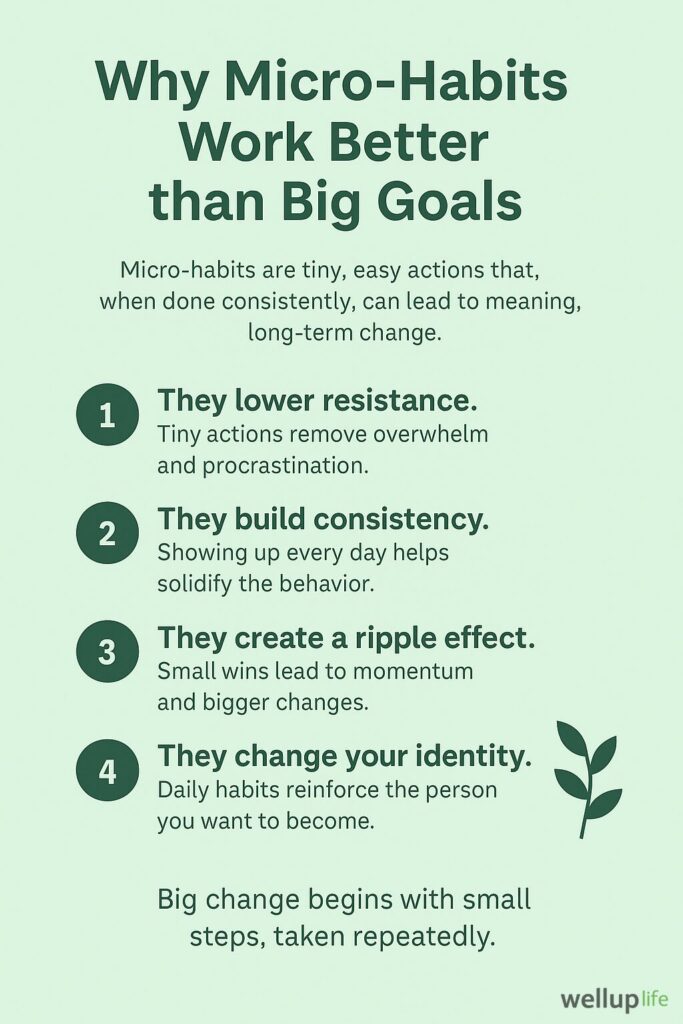
“Every action you take is a vote for the type of person you wish to become.”
 — James Clear, Atomic Habits
— James Clear, Atomic HabitsReady to take the first step toward a better you, without feeling overwhelmed? This beautifully designed printable gives you everything you need to stay on track for the next 7 days: In this 7-day self-improvement PDF, you will get:
So, start building your mindset, clarity, and confidence — one day at a time. Just enter your email to get instant access.
This 7-Day Self-Improvement Challenge proves that transformation doesn’t require massive effort or dramatic life changes; it simply starts with small, consistent actions. Micro-habits, like five minutes of gratitude or a short walk, may seem simple, but they compound over time to shift your mindset, improve your focus, get rid of mental fog, and build emotional resilience.
It is designed to be easy yet powerful. This challenge helps reduce overwhelm by focusing on just one task per day, making it ideal for beginners or anyone looking to regain momentum. With consistency, these small wins not only boost confidence but also lay the foundation for long-term personal growth. And with the free printable PDF, you’ll have a clear, trackable system to guide you through each day with intention and purpose.
Read Next: 10 Simple Yet Powerful Daily Habits to Improve Your Life
Stoic Thinker
Nitin Yadav, Editorial Director and Review Board Member at Wellup Life, is a Stoic thinker who inspires personal growth through resilience, discipline, and clarity.

Reviewed By:

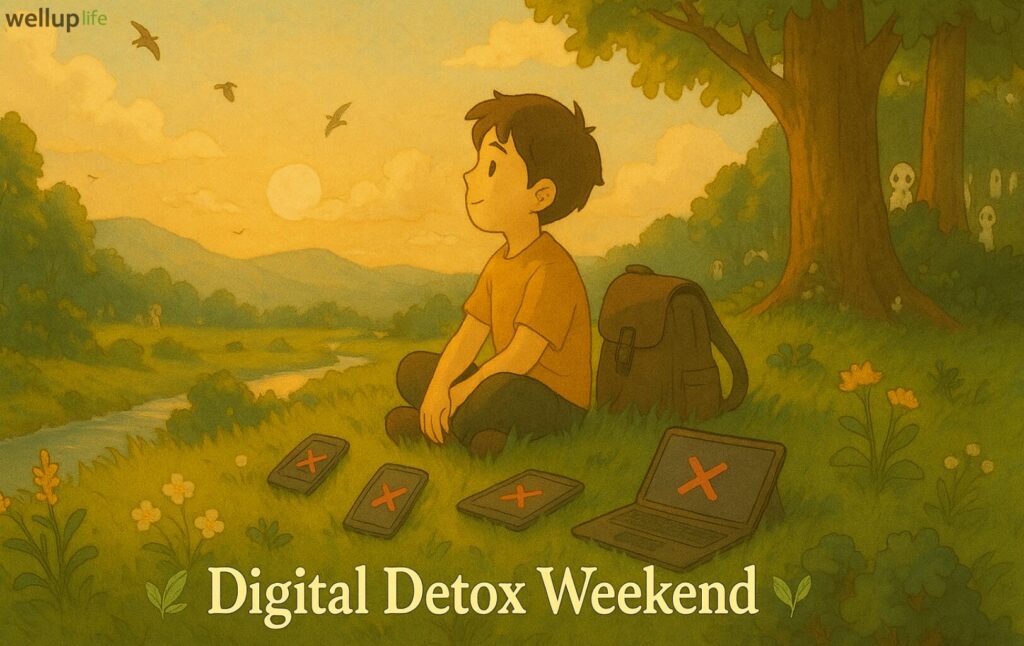
Reviewed By:


Reviewed By:

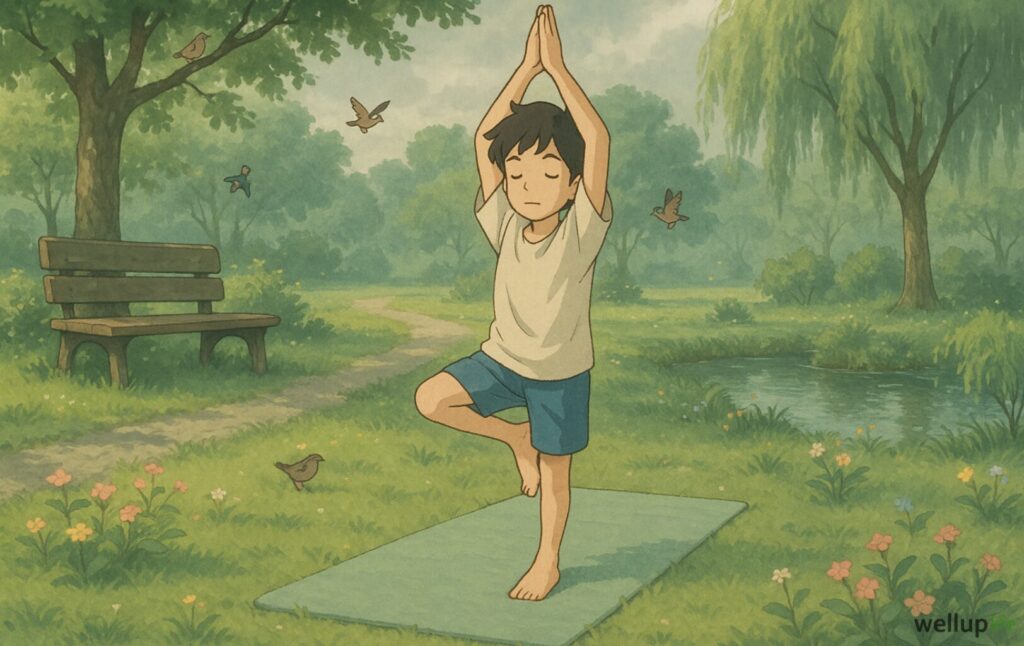
Medically Reviewed By:

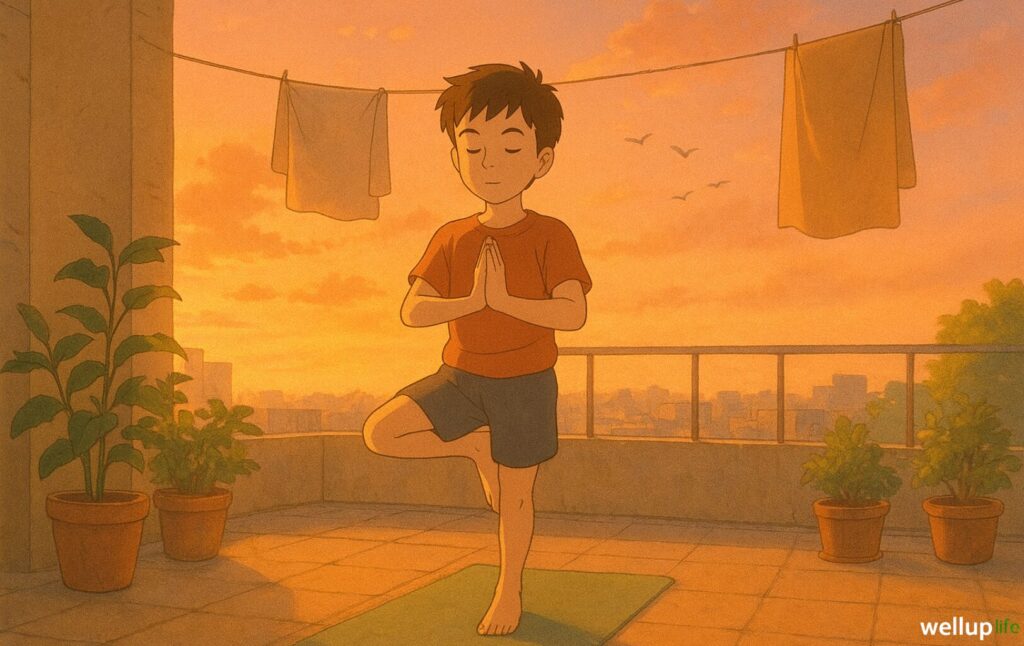
Reviewed By:

Wellup Life is your space for personal growth, wellness, and mindful living. From self-improvement and productivity to spirituality and relationships, we share practical insights and timeless wisdom to help you live with clarity, balance, and purpose.
Copyright © 2024 – Wellup Life — All rights reserved
